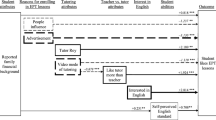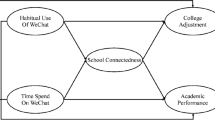Abstract
The factors that influence student academic performance have long been discussed by academics. However, to our knowledge, there are no data on the informal learning activities organised by parents. Therefore, there is a need to explore how parents influence student academic performance. To do so, we acquired a dataset from the China Education Panel Survey (CEPS) to test the proposed measurements (e.g. the frequency of visiting museums with parents) through regression models. Several findings are summarised in the results. For instance, we found that there is a positive and significant association between parent-organised informal learning activities and student academic performance. Such a linkage can be negatively moderated by students' self-reported course difficulty in some cases (e.g. when students are frequently eating dinner with their parents). In terms of contribution, this study may be one of the first to discuss how parent-organised informal learning activities influence student academic performance.

Similar content being viewed by others
Data Availability
The data that support the findings of this study are available from the corresponding author, C. Zeng, upon reasonable request.
References
Akgun, S., & Ciarrochi, J. (2003). Learned resourcefulness moderates the relationship between academic stress and academic performance. Educational Psychology, 23(3), 287–294.
Bamberger, Y., & Tal, T. (2007). Learning in a personal context: Levels of choice in a free choice learning environment in science and natural history museums. Science Education, 91(1), 75–95.
Chang, S., Wang, J., Cheng, L., Guo, M., Wang, L., & Kong, P. (2020). Family dinner and the happiness of Chinese adolescents: Identifying mediators and moderators. Journal of Youth and Adolescence, 49, 1674–1686.
Chao, R. K. (1995). Chinese and European American cultural models of the self reflected in mothers’ childrearing beliefs. Ethos, 23(3), 328–354.
Chao, R. K., & Tseng, V. (2002). Parenting of asians In M. H. Bornstein (Ed.), Handbook of parenting: Vol. 4. Social conditions and applied parenting (pp. 59–93). Psychology Press
China Education Panel Survey (CEPS). (2017). Retrieved from ceps.ruc.edu.cn website: http://ceps.ruc.edu.cn/English/Home.htm
Cirino, P. T., Fuchs, L. S., Elias, J. T., Powell, S. R., & Schumacher, R. F. (2015). Cognitive and mathematical profiles for different forms of learning difficulties. Journal of Learning Disabilities, 48(2), 156–175.
Costigan, C., & Su, T. F. (2008). Cultural predictors of the parenting cognitions of immigrant Chinese mothers and fathers in Canada. International Journal of Behavioral Development, 32(5), 432–442.
Crowley, K., Pierroux, P., & Knutson, K. (2014). Informal learning in museums.
DeWitt, J., & Storksdieck, M. (2008). A short review of school field trips: Key findings from the past and implications for the future. Visitor Studies, 11(2), 181–197.
Eisenberg, M. E., Olson, R. E., Neumark-Sztainer, D., Story, M., & Bearinger, L. H. (2004). Correlations between family meals and psychosocial well-being among adolescents. Archives of Pediatrics & Adolescent Medicine, 158(8), 792–796.
England, B. J., Brigati, J. R., Schussler, E. E., & Chen, M. M. (2019). Student anxiety and perception of difficulty impact performance and persistence in introductory biology courses. CBE—Life Sciences Education, 18(2), ar21.
Eshach, H. (2007). Bridging in-school and out-of-school learning: Formal, non-formal, and informal education. Journal of Science Education and Technology, 16(2), 171–190.
Fuchs, L. S., Fuchs, D., Compton, D. L., Powell, S. R., Seethaler, P. M., Capizzi, A. M., Schatschneider, C., & Fletcher, J. M. (2006). The cognitive correlates of third-grade skill in arithmetic, algorithmic computation, and arithmetic word problems. Journal of Educational Psychology, 98(1), 29.
Garner, L. C., & Gallo, M. A. (2005). Field trips and their effect on student achievement and attitudes: A comparison of physical versus virtual field trips to the Indian River Lagoon. Journal of College Science Teaching, 34(5), 14.
Gerber, B. L., Marek, E. A., & Cavallo, A. M. (2001). Development of an informal learning opportunities assay. International Journal of Science Education, 23(6), 569–583.
Greenhow, C., & Robelia, B. (2009). Informal learning and identity formation in online social networks. Learning, Media and Technology, 34(2), 119–140.
Hofferth, S. L., & Sandberg, J. F. (2001). How American children spend their time. Journal of Marriage and Family, 63(2), 295–308.
Huang, T. K., & Huang, E. (2017). Does applying screenshot annotations enhance learning effectiveness? The moderating role of course difficulty. https://doi.org/10.24251/HICSS.2017.011
Istead, L., & Shapiro, B. (2014). Recognizing the child as knowledgeable other: Intergenerational learning research to consider child-to-adult influence on parent and family eco-knowledge. Journal of Research in Childhood Education, 28(1), 115–127.
Johnston, M. P. (2014). Secondary data analysis: A method of which the time has come. Qualitative and Quantitative Methods in Libraries, 3(3), 619–626.
Junco, R. (2012). The relationship between frequency of Facebook use, participation in Facebook activities, and student engagement. Computers & education, 58(1), 162–171.
Kirschner, P. A., & Karpinski, A. C. (2010). Facebook® and academic performance. Computers in Human Behavior, 26(6), 1237–1245.
Kisida, B., Bowen, D. H., & Greene, J. P. (2016). Measuring critical thinking: Results from an art museum field trip experiment. Journal of Research on Educational Effectiveness, 9(sup1), 171–187.
Larson, R. W., Branscomb, K. R., & Wiley, A. R. (2006). Forms and functions of family mealtimes: Multidisciplinary perspectives. New Directions for Child and Adolescent Development, 2006(111), 1–15.
Lee, J. S., & Dressman, M. (2018). When IDLE hands make an English workshop: Informal digital learning of English and language proficiency. Tesol Quarterly, 52(2), 435–445.
Li, Z., & Qiu, Z. (2018). How does family background affect children’s educational achievement? Evidence from Contemporary China. The Journal of Chinese Sociology, 5(1), 1–21.
Liu, Y., Hau, K. T., Liu, H., Wu, J., Wang, X., & Zheng, X. (2020). Multiplicative effect of intrinsic and extrinsic motivation on academic performance: A longitudinal study of Chinese students. Journal of Personality, 88(3), 584–595.
Locke, E. A., & Latham, G. P. (2002). Building a practically useful theory of goal setting and task motivation: A 35-year odyssey. American Psychologist, 57(9), 705.
Ma, J. L. (2008). Eating disorders, parent–child conflicts, and family therapy in Shenzhen. China. Qualitative Health Research, 18(6), 803–810.
Meyers, E. M., Erickson, I., & Small, R. V. (2013). Digital literacy and informal learning environments: An introduction. Learning, Media and Technology, 38(4), 355–367.
Pekrun, R. (2006). The control-value theory of achievement emotions: Assumptions, corollaries, and implications for educational research and practice. Educational Psychology Review, 18, 315–341.
Pike, J., Kelly, P., Pike, J., & Kelly, P. (2014). The school dining room: A governable space. The Moral Geographies of Children, Young People and Food beyond Jamie’s School Dinners. https://doi.org/10.1057/9781137312310
Rogers, A. (2014). The base of the iceberg: Informal learning and its impact on formal and non-formal learning (p. 97). Verlag Barbara Budrich.
Rubinsten, O., & Tannock, R. (2010). Mathematics anxiety in children with developmental dyscalculia. Behavioral and Brain Functions, 6, 1–13.
Sommerhoff, D., Szameitat, A., Vogel, F., Chernikova, O., Loderer, K., & Fischer, F. (2018). What do we teach when we teach the learning sciences? A document analysis of 75 graduate programs. Journal of the Learning Sciences, 27(2), 319–351.
Sotomayor, S. (2021). Long-term benefits of field trip participation: Young tourism management professionals share their stories. Journal of Hospitality, Leisure, Sport & Tourism Education, 29, 100285.
Suizzo, M. A., Pahlke, E., Yarnell, L., Chen, K. Y., & Romero, S. (2014). Home-based parental involvement in young children’s learning across US ethnic groups: Cultural models of academic socialization. Journal of Family Issues, 35(2), 254–287.
Supple, A. J., Ghazarian, S. R., Peterson, G. W., & Bush, K. R. (2009). Assessing the cross-cultural validity of a parental autonomy granting measure: Comparing adolescents in the United States, China, Mexico, and India. Journal of Cross-Cultural Psychology, 40(5), 816–833.
Swanson, H. L., & Beebe-Frankenberger, M. (2004). The relationship between working memory and mathematical problem solving in children at risk and not at risk for serious math difficulties. Journal of Educational Psychology, 96(3), 471.
Wang, H., & Cai, T. (2017). Parental involvement, adolescents’ self-determined learning and academic achievement in Urban China. International Journal of Psychology, 52(1), 58–66. https://doi.org/10.1002/ijop.12188
Weinstein, M., Whitesell, E. R., & Schwartz, A. E. (2014). Museums, zoos, and gardens: How formal–informal partnerships can impact urban students’ performance in science. Evaluation Review, 38(6), 514–545.
Whitesell, E. R. (2016). A day at the museum: The impact of field trips on middle school science achievement. Journal of Research in Science Teaching, 53(7), 1036–1054.
Zhang, W., Wei, X., Ji, L., Chen, L., & Deater-Deckard, K. (2017). Reconsidering parenting in Chinese culture: Subtypes, stability, and change of maternal parenting style during early adolescence. Journal of Youth and Adolescence, 46, 1117–1136.
Zhu, N., & Chang, L. (2019). Education and parenting in China. School Systems, Parent Behavior, and Academic Achievement: an International Perspective. https://doi.org/10.1007/978-3-030-28277-6
Acknowledgements
We would wish to wholeheartedly thank the anonymous reviewers who provided insightful comments on earlier versions of the paper.
Funding
Not applicable.
Author information
Authors and Affiliations
Contributions
All authors contributed to the study conception and design. Material preparation, data collection, and analysis were performed by SP and CZ. The first draft of the manuscript was written by SP and all authors commented on previous versions of the manuscript. All authors read and approved the final manuscript.
Corresponding author
Ethics declarations
Conflict of interest
On behalf of all authors, the corresponding author states that there is no conflict of interest.
Additional information
Publisher's Note
Springer Nature remains neutral with regard to jurisdictional claims in published maps and institutional affiliations.
Rights and permissions
Springer Nature or its licensor (e.g. a society or other partner) holds exclusive rights to this article under a publishing agreement with the author(s) or other rightsholder(s); author self-archiving of the accepted manuscript version of this article is solely governed by the terms of such publishing agreement and applicable law.
About this article
Cite this article
Peng, S., Zeng, C. Family Dinner Frequency, Parent-Organised Informal Learning Activities, and Student Academic Performance: Evidence from Chinese Eighth-Grade Students. Asia-Pacific Edu Res 33, 625–633 (2024). https://doi.org/10.1007/s40299-023-00759-5
Accepted:
Published:
Issue Date:
DOI: https://doi.org/10.1007/s40299-023-00759-5




